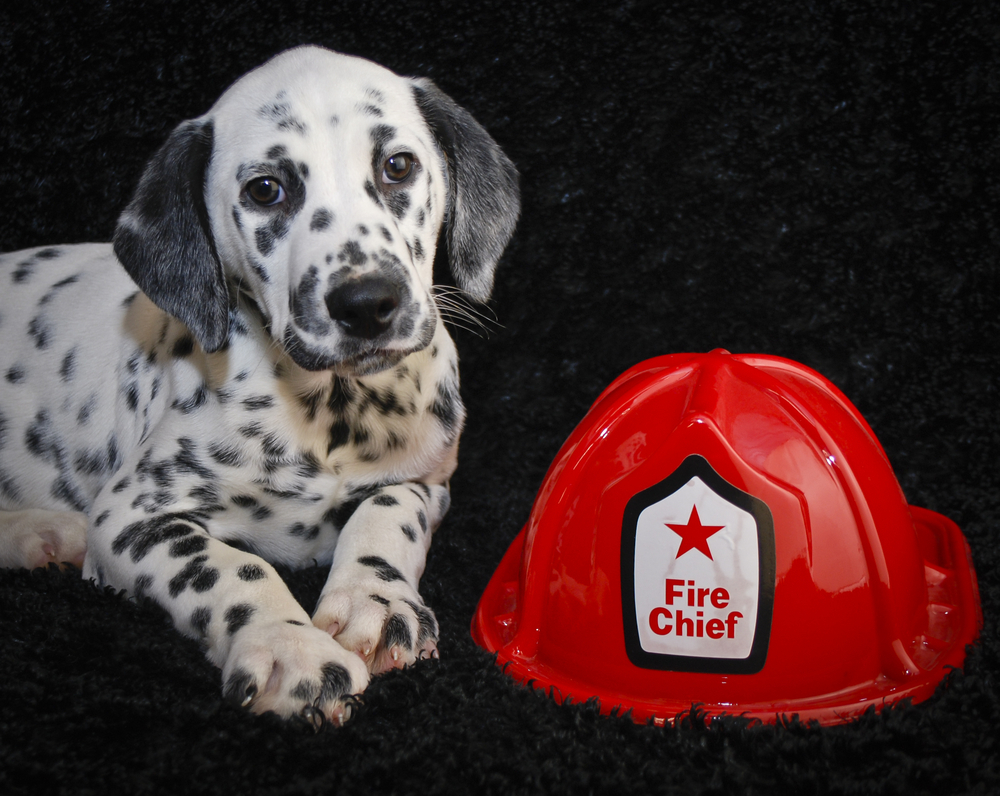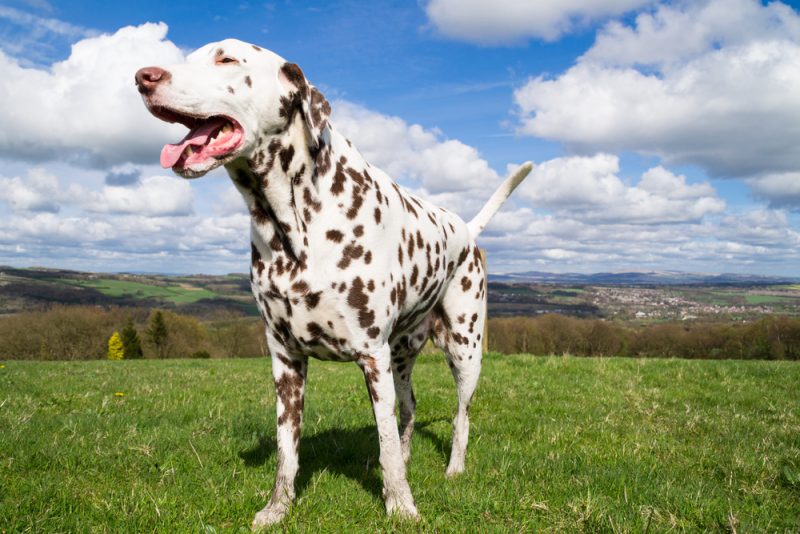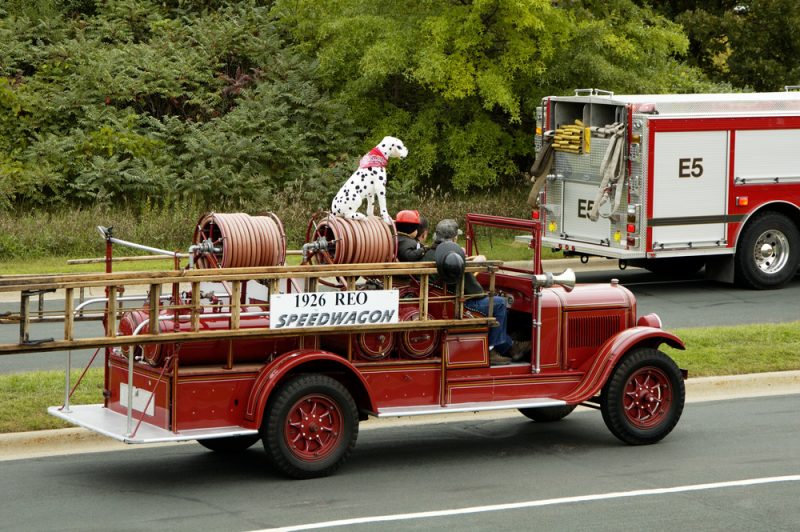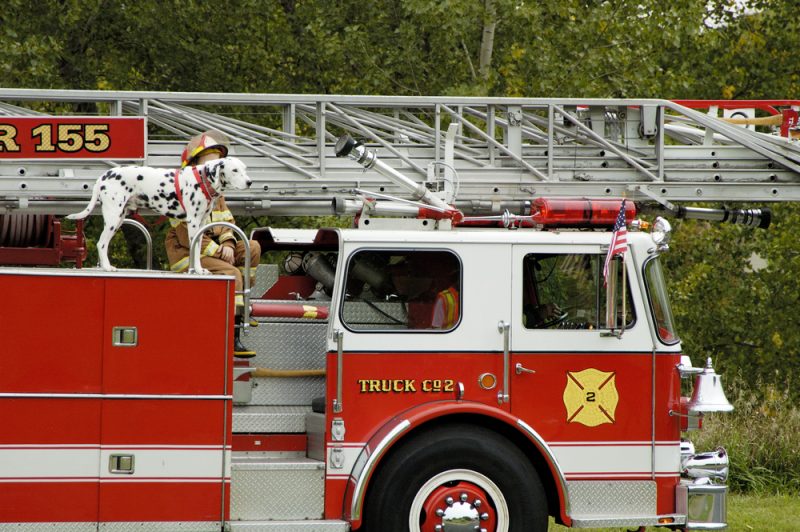
Like actors, some dog breeds seem destined to be “typecast” into certain roles. Take Collies, for example. These long-haired, regal-looking pups are often associated with the fictional dog Lassie. Great Danes? It’s hard not to imagine the Scooby-Doo, the mystery-solving, scaredy-pants. However, when it comes to Dalmatians, two iconic and very different roles stand out. These spotted pups captivated children worldwide in 1961 and 1996 with the release of Disney’s 101 Dalmatians. However, they’ve simultaneously earned themselves legendary status, standing steadfastly alongside firefighters for centuries.
If you’ve ever wondered why the word “Dalmatian” conjures up images of faithful pups riding alongside firemen in bunker gear, you need to keep reading. We’re going to take a deep dive into the history of the world-famous firehouse dogs.

Dalmatians in Firehouses Over the Centuries
The 1700s
In the 1700s, people still used horse-drawn carriages to travel. Folks realized that Dalmatians were great at running alongside the horses and keeping up with them, even traveling as far as 20 to 30 miles per day and after sprinting long distances, often in pairs.
Dalmatians earned themselves a bit of a reputation as “coach dogs” throughout England, Scotland, and Wales when wealthy aristocrats sought out these spotted pups not for companionship but for use with their coaches. They became a status symbol of sorts; the more dogs you had running alongside your coach, the higher up you were on the social totem pole.
It was an easy and natural transition from following the coaches to accompanying horse-drawn firefighting equipment.

The 1800s
The earliest fire engines were nowhere near the massive behemoths that cruise down our streets with their sirens roaring. The early models were hand-pumped engines, which came long before the advent of steam and gasoline-driven pumping engines. The firefighters pulled these models by hand. It wasn’t until around the 1850s that heavy steam-driven engines replaced the hand-pumped ones, and horsepower became necessary.
When firefighters started using horses to pull their water pumps, Dalmatians were an obvious choice to have running alongside their engines. They served as living sirens, barking their way through the streets and clearing pedestrians out of the way. When the fire alarm would sound, these pups were trained to run out of the firehouse and bark to let bystanders know the wagon would be coming soon.
A Dalmatian’s work wasn’t done when they reached the burning inferno, either. They kept themselves busy by occupying the horses (who were often fearful of the fire) and ensuring no one would steal them in all the chaos of the firefighting.
The 1900s
The first motorized fire engine was created in 1897, and most departments transitioned from horse-drawn carriages to motorized vehicles in the 1910s. The final firehorse to retire did so in 1922.
With the advent of the motorized firefighting truck, Dalmatians weren’t needed to occupy the horses anymore. However, these spotted pups still had a place of honor in the firehouses, even if they had no interest in following the trucks.
The public’s association of Dalmatians as steadfast firehouse mascots took hold in 1951 when the National Fire Protection Association introduced Sparky the Fire Dog. Sparky was the key representative in sending messages to children about fire hazards and safety measures.


Dalmatians in the Firehouse Today
Though the days of Dalmatians running alongside and ahead of firetrucks are long over, these pups still hold a space in many firefighter’s hearts. They are honorary firefighters, still earning their keep in many firehouses in the world. They act as friendly companions to preserve the longstanding tradition, and some even stand guard on the firefighters’ gear and possessions. So, while you won’t see a Dalmatian running alongside the fire truck anymore, you may catch glimpses of them riding inside the trucks.
Even Sparky the Fire Dog is still relevant today. Over 70 years later, Sparky’s image is still used to help elementary school children know what to do in case of a fire. While his image has changed a bit (he can now dance and play the electric guitar), his messages remain the same.
Additionally, real Dalmatians are sometimes used to teach young children fire safety skills. They can be trained to show little ones how to “Stop, Drop, and Roll,” much to the delight of the youngsters.
Why Did Firehouses Use Dalmatians?
With so many athletic and loyal dog breeds to choose from, you may wonder why firehouses picked Dalmatians to work alongside their staff.
There are several reasons for this, all of which come down to Dalmatians’ unique set of characteristics, which made them ideal companions for olden-day firehouses.

Affinity for Horses
Dalmatians were widely used around horses back in the 1700s and 1800s due to their affinity toward the creatures. These spotted pups seemed to form amazingly tight bonds with the horses, not allowing strangers to touch them. They also had a knack for keeping up with the horses, something many other dog breeds lacked. Once word got around about how loyal these dogs were to horses, coach drivers went to great lengths to find these pups to assist them and watch their teams.
A Dalmatian’s loyalty was especially beneficial when they started in the firehouses. When other dogs or bystanders would harass or disturb the horses while out of the station, the Dalmatians weren’t afraid to fiercely protect them.
Personality Traits
Dalmatians have several personality traits that lend themselves well to the job, too.
They are brilliant and easy to train. They rank moderately high on the canine intelligence scale, with an “above average working dog” intelligence.
They’re naturally excitable, so when the town fire bells would go off, their excitement and reaction would help ready the horses for the work they were about to do. Additionally, this enthusiasm was beneficial for alerting the townspeople of an incoming fire truck.

Athleticism
Dalmatians are naturally athletic dogs. They have unusually high stamina and can run long distances with no problem. They never tired of chasing after the trucks and always looked forward to having a job to do when they arrived at the fire alongside their horses.

Final Thoughts
The history of Dalmatians in the fire department is undoubtedly fascinating. It’s incredible to see just how crucial these pups were to the success of early firefighters. Though Dalmatians aren’t necessary at the modern firehouse, it’s clear that this breed has earned its keep.
They don’t need to run alongside firetrucks or alert bystanders of the incoming fire brigade, but that doesn’t mean their work in the fire department is done. Many modern fire departments keep Dalmatians on their payroll to act as companions for the firefighters and as watchdogs over their costly equipment.
Featured Image Credit: JStaley401, Shutterstock

